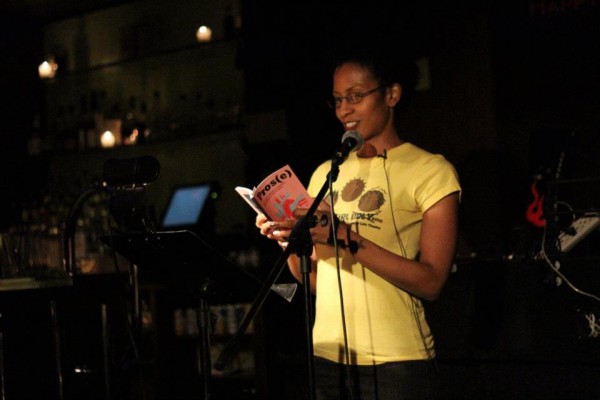
Released in the fall of 2012, Pros(e) is the first anthology of writings from the Red Umbrella Project’s Becoming Writers workshop, a creative non-fiction workshop for people with experience in the sex industries. Caty Simon and Jessie Nicole produced this collaborative review out of an hours long conversation that had to be abridged to a fourth of its original size to be readable. We had a lot of feels, as the kids say.
A notable story for both of us (and Jessie’s favorite) was “Fist” by Josh Ryley, which we both had strong visceral reactions to. The mix of humor and horror was nothing short of brilliant, and like all the best pieces here, it illustrated a ubiquitous sex worker concern–what happens to a sex worker if a client gets seriously hurt during a session? Other pieces felt incomplete, like introductions to an untold story happening outside of the pages. And some left us lukewarm or cranky. But the power of Pros(e) is in the variety of experience.
Caty: Melissa Petro’s introduction opens with simple but vital points. We’re taught that sex workers are “if not worthless, than worth less.” We feel the need to tell ourselves we’re exceptional, to distinguish ourselves from the rest of that hoish rabble. This engenders horrible, elitist attitudes reflected in many other sex work memoirs, sometimes from the title onwards, as in Ivy League Stripper and the like. These attitudes also create barriers to organizing together. A collaborative writing project like this can make the vital difference. We show each other how we are the same, rather than one sex worker writing to show how a nice girl like her happened to end up in a place like this. Petro also reminds us of the erasure of male and trans* sex workers, and Pros(e) works against that by including a wide spectrum of voices from the sex industries.
Jessie: Pros(e) connects the value of storytelling, an idea driving RedUP, to the concrete benefits that sex workers can gain from having a venue to tell their stories. This anthology, simply by virtue of existing, is part of a larger project to counteract the stereotypes and stigma that works to threaten those in the sex industries.
Caty: The first piece, Kenney Kelley’s “Notes from the Red Room” is my favorite. It was more skillful and packed more of a punch than many already published sex work memoirs, illustrating the importance of encouraging previously unpublished writers. I actually found the contributions in Pros(e) by published writers too glib or maudlin in comparison.
Jessie: It was one that I related most to, though I’ve never worked in that kind of situation. But I think she really gets to the heart of a lot of sex workers’ experiences.
Caty: Kenney manages to be hilarious without degrading her clients or herself. She’s just pointing out the absurdities that are inherent to any service industry.
Jessie: Yes! I think she does an incredible job at sharing stories about her clients without being exploitative about it. Client stories often seem to exist only for titillation or villainization, and working against client stigma is becoming an increasing element of sex work activism.
Caty: Yeah, sometimes it feels like sex workers attempt to find solidarity with each other by saying derogatory things about clients, but that can be an attack on the idea of paying for sex itself. That’s NOT to say that power dynamics between sex workers and their usually cis white guy clients shouldn’t be examined.
Jessie: There’s also a difference between complaining about clients (who doesn’t complain about work?) and denigrating clients on principle. There are bad clients and serious problems with the nature of many transactions. But universally blaming clients doesn’t address the underlying structures.
Caty: When Kenny describes looking in the mirror to see how one performs one’s service, I noted pretentiously, “SWer writing reveals that the SWer is never the mute object of the public imagination. The SWer creates herself as commodity & consumes it along w the client.”
Jessie: Equally pretentiously I was contemplating Marx and alienation from production — how that relationship is complicated in service industries and emotional labor. We are relatively detached from our services, but when that service is so intimate that detachment can be really hard! And alienation from ourselves is not inherent to sex work; the way systems are set up around sex work create that necessity.
Caty: Totally! Which segues into how Kenney sees her thoughts as her last bit of private property, and lashes out at the client who asks her what she’s thinking. Arlie Hochschild’s concept of emotional labor is so vital when thinking about sex work.
Jessie: Ditto for Michael Hardt’s Affective Labor, especially for framing sex work as a service industry. I don’t think we can adequately address a healthy balance between detachment and engagement until we frame our labor, whether it be emotional or purely manual, as labor. As long as sex work isn’t seen as WORK that balance will be excruciatingly difficult to strike.
Caty: Finally, I love how she goes into the struggle to hide one’s period. I had an involved conversation with other sex workers about that passage and EVERYONE had a sponge up the twat or a leakage story. Memoirs, whether glamorizing or lamenting sex work, seldom go into graphic detail that’s NOT salacious like that, about the actual experience of being a sex worker rather than the fetishization of the experience of being a sex worker.
Jessie: And it’s those graphic details that for me make this anthology so powerful. Sex work is graphic. Bodies do funny things. And intimacy is messy.
Caty: And labor is messy. Dominick contributes a series of 3 vignettes. I found it gratifying that most of the depictions of drug use in Pros(e) are complex, like the depictions of every other part of life: no judgement, moral panic, self-loathing, or NA dogma. I love the descriptions of coke dick nightmare. It reminds me of all the wacky late night calls when I was a little apprentice ho, before I learned to screen people on uppers out. I’m anti-drug war and pro responsible drug use, but please don’t do a drug that makes you volatile, impotent and yet obsessed with sex when you want to pay me to fuck you.
Jessie: The relationship between drugs and the sex industries is overwhelming to me at some points.
Caty: Black markets naturally intersect, as do grey markets.
Jessie: And more criminalization = more danger
Caty: The idea that all sex workers are degenerate drug users, or that drug use is a natural consequence of sex work are both fallacious. But I also hate the way the sex workers’ rights movement, until quite recently, distanced itself from anti drug war and harm reduction politics. I guess I understand that impulse, because we’re already stigmatized enough, but it saddens me. Lately there’s been more honesty, inclusiveness, and collaboration.
Jessie: The sex workers’ rights movements’ deep investment in respectability politics is a major problem.
Caty: Don’t we see the problems of going down that road? Like the LGBTQ movement. It’s totally alienated the people who needs its help the most.
Jessie: But the people who need help most are rarely (if ever) the people with access to resources.
Caty: Which is something the people with access to resources should acknowledge and work to address.
Jessie: Truth! I think assuming there’s a “movement” or even a “we” as activists or sex workers though can erase the internal hierarchies of both activism and sex industries.
Caty: Back to Dominick! I felt bad for him when he writes:
“It’s long past time to wrap up this sordid call, and I feel that the whole scene is unraveling. Have I been taken in by a scheming, manipulative, morbidly obese, coked-out fisting bottom?”
But I also kinda wanted to reach out through the book and smack him for not getting the money before the call – especially with a client like that. “We’re going to the ATM,” indeed. And this is far from the only time someone gets stiffed because they didn’t collect first in Pros(e)!
Jessie: Last summer Jenny Demilo started fairywhoremother.com to try and centralize that kind of advice. We’re so damn isolated that many of us only learn those lessons the hard way. The lack of community, stigma, and isolation makes the sex industries MORE dangerous partly because people have little to no connections or people to learn from.

Caty: Good segueway to Essence Revealed’s “Push and Pull.” She writes a lot about support and the lack thereof. She relates a conversation with a friend that I’ve had many times from both sides – do you need me to kick your ass and tell you to go to work, or to tell you it’s OK you’re not working today? And then the isolation of depression is made worse by the isolation usual to those self-employed in gray or black markets. No one will check on you if you disappear for days, leaving you more open to Bell Jar moments like resenting having to get up from bed to go the bathroom, which, pathetically enough, I also totally identified with.
Jessie: Her account of her experiences with the mental health system as a sex worker of color absolutely slayed me. And I related to the work debate as well! It can be hard (or impossible) to tell if working will be more damaging or encouraging. Sometimes putting on that persona can be a welcome escape, but sometimes it’s so fucking draining.
Caty: And sometimes the state of one’s psyche just can’t matter because you need the money, and thus your fellow sex worker kicks your ass and makes you get changed. I read Unequal Desires by Siobhan Brooks recently and it amazes me how her observations about how black women are devalued in desire industries play out in every account I read by sex workers of color. Clubs limit the number of black women on the floor at a time, thus constructing what men expect to desire in a strip club, and then say that men will never pay for more black women.
Jessie: The sex industries can be blatant illustrations of institutionalized racism working throughout society. Strip clubs can be openly segregated, but is that better or worse than industries that are insidiously segregated without stating it? It worries me when white sex workers are either unaware of or unwilling to acknowledge or work to fight that racism. (By “worries” I mean “really fucking infuriates” me.) Sex industries, like other industries, are stratified by race, class, sexuality, gender (in all ways imaginable), disability, immigration… in ways that dramatically change the work itself. What I love about this anthology is that it emphasizes both some of the universal struggles with labor, sexism, racism, etc. in ways that almost anyone can relate to while still poignantly illustrating some of the challenges that are unique to sex work.

Caty: Veronica Vera’s selections “Cherry Pop” and “A Porn Star Remembers… Senator Arlen Specter” take us back to the ‘80s with her memoirs of doing porn with Annie Sprinkle then testifying before the Senate.
I like work that gives us access to sex worker history. Black/gray markets rarely get to document their history, and I might never have known that porn performers testified in front of Reagan’s Meese Commission, let alone read about it from their perspective. There are little things I like about these pieces, like how Veronica Vera compares Annie Sprinkle and herself to Victoria Woodhull and her sister, Tennessee Claflin, two early feminist sex radicals one almost never gets to read about, kinda tying this back to the theme of recovered sexual outlaw history.
But I want to hold Vera accountable for not being critical of Gerald Damiano for enabling the horrifying domestic violence that Linda Lovelace was subjected to on the Deep Throat set at the hands of her pimp husband. In Ordeal, Lovelace describes how everyone heard her screaming but only made sure not to look her in the eye the next day during filming. I know Lovelace became a poster child for the anti-porn lobby, but that doesn’t invalidate her account of her life. Anyway, later she was just as down on the anti-porn feminists for exploiting her and not compensating her for her efforts. I guess she was their decade’s Somaly Mam.
Jessie: I have a LOT of feelings about this piece. But aesthetically I just couldn’t take it seriously. Because of this:
I dove into Annie’s big milky breast cushions, lost inside Mommy’s nurturing breasts…Her naked cunt glared at me like some hypnotic third eye, so delicate, so frightening, so powerful, so pink! Behind me, Michael Cycle cooed romantically, “Lift your butt.”…He urged his cock into the curves of my vagina, like he leaned his Harley into a tight mountain road. I lowered my tongue to take communion from the sacred hole of Annie Sprinkle….
Caty: Yeah, a lot of the attitude and diction was alien to me — that whole 70s sexual liberation mindset pre-AIDS. And kitschy writing like that reads sexy to these people?
Jessie: Whose vagina is curved like a mountain road? And can you ever romantically coo “lift your butt”? I don’t even want to start on big milky breast cushions. This honestly read like a mockery of bad erotica. The literary quality made it hard for me to even delve into the content.
Caty: I have to say I don’t like Annie Sprinkle’s new age approach, and I find her to be classist sometimes, but she did a lot for the sex workers’ rights movement.
Jessie: I appreciate the inclusion of sex work activism history. I was fascinated by the second part about testifying in front of the Senate! I would have loved more focus on that!
However, Annie Sprinkle’s version of sex work activism is VERY well documented and almost constantly celebrated, even revered, in sex work activist communities. I feel like that focus comes at the expense of other voices and efforts. There were AIDS activists concerned with queer sex, porn, and sex work in the 80s as well, sex workers of color organizing, and there have always been sex workers involved in anti-racist and anti-poverty movements. I’m feeling burned out and seriously bothered devoting more time, space, and hero worship to the same people.
Caty: I absolutely agree that as a movement we could use more about our POCs and more marginalized members rather than just holding up Gloria Lockett and Cal-PEP as tokens for eternity. There’s this golden Camelot era feel to the piece.
Meanwhile, stage left, like I wrote earlier, Linda Lovelace is being brutalized which they all KNEW ABOUT AT THE TIME. And in an article Tracy Quan wrote interviewing Sprinkle and others Sprinkle said that they didn’t interfere because back then domestic violence was a private matter between the couple. That’s a truly bullshit excuse, for self-avowed radicals to fall back on traditional norms because they’re scared of intervening.
Jessie: Seriously! I wanted Vera to go deeper and show more self-reflection and understanding of the context in which her story was taking place. This doesn’t take away from the good Sprinkle and Club 90 did either! Just puts it in a context of other fucked up shit. Intersectionality is a bitch to engage with, and terribly tangled, but hierarchies are very rarely clear or constant, especially in activist communities.
Caty: I hear you. We shouldn’t fall into a mindset where we can’t criticize the old guard.
Jessie: Founder-itis is dangerous! I also think it’s important to note that this is a review for a sex worker publication. At the end of the day I stand firmly behind this anthology. Especially outside of sex work communities.
Caty: I hope Pros(e) achieves wider distribution. I think it represents us as a movement in solidarity much better than some of the individualist works of the sex worker literati.
Jessie: The anthology model lends itself well to sex work narratives. An underlying message is that there is no universal sex work experience or sex work memoir that can be representative of the sex industries.
Caty: Pros(e) confirms RedUP’s writing workshop is just as vital as more explicitly activist campaigns. Teaching our community to tell its stories allows us to represent ourselves in all our complexity to the mainstream world, to have them acknowledge our humanity as they’re gripped by our stories.
Jessie: And we’ll hear each other, feel less isolated, and it will build solidarity in our communities. And how have I not mentioned yet how much I love the title? Puns make me so happy!
Caty: Especially pretentious puns utilizing parentheses! Viva la Pros(e)!
Well fucking done. Grateful for this.
Caty – can I request a tit smack? Thanks, Dominick.
(BTW that trick did stiff me- when we went to the ATM, he couldn’t withdraw money “for some reason”. Then he tried to mace me, and I ran out of the ATM with his wallet. I later returned his wallet; he apologized for his fucked-up conduct. He eventually took my suggestions and got into a recovery program, and gave me a money order for my full due.)
Props for being able to take his wallet–you had more guts than I did in bad calls. *titsmack*
Damn. This was informative and interesting to read. Nicely done.
Thanks! Means a lot coming from you.
Damn I missed this and I live in Chinatown!
THANKS for the T’script